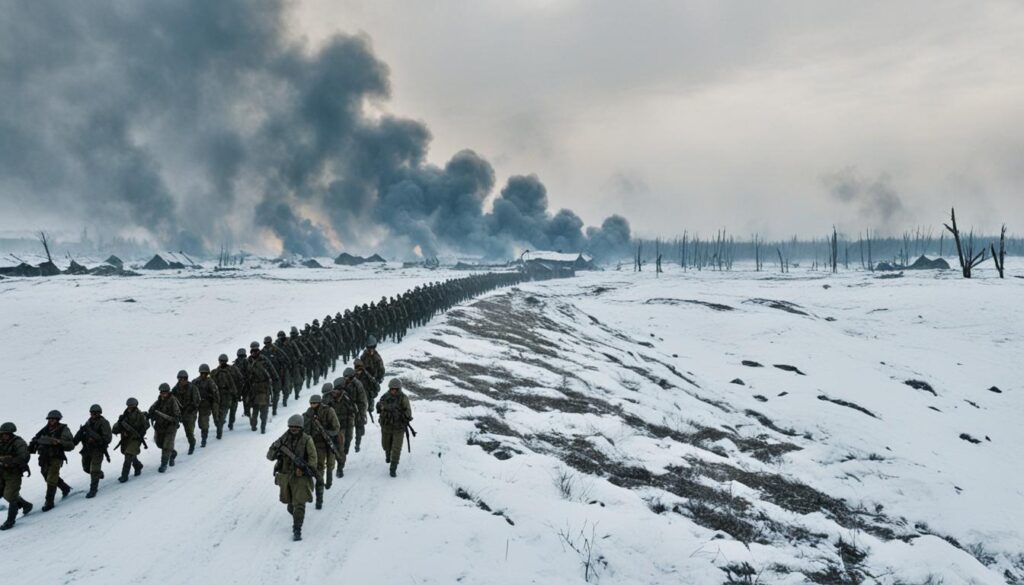In our latest audiobook review, we take a deep dive into E.L. Doctorow’s historical novel, The March. Set during the American Civil War, the book follows General William Tecumseh Sherman’s path of destruction through Georgia and the Carolinas, exploring the lives of diverse characters affected by the war.
With an impressive ensemble of narrators and voice actors, the audiobook version of The March brings this epic story to life in vivid detail. Join us as we explore the nuances of Doctorow’s writing, the complex character development, and the audio production that cemented its place as a must-listen classic.
Key Takeaways:
- E.L. Doctorow’s The March is a historical novel set during the American Civil War.
- The book explores the lives of various characters affected by the war, including General William Tecumseh Sherman.
- The audiobook version features a talented ensemble of narrators and voice actors that enhance the story’s epic quality.
- The novel’s unique narrative style and character development make it a must-listen for fans of historical fiction.
- The March’s lasting legacy and impact on the literary world cement it as a classic.
Overview of “The March”
E.L. Doctorow’s “The March” is a historical novel set during the final year of the American Civil War. The novel follows the journey of General William Tecumseh Sherman’s army as it marches through Georgia and the Carolinas, leaving a trail of destruction in its wake. Along the way, the novel introduces readers to an array of characters, including soldiers, slaves, and civilians, whose lives are impacted by the war.
As a novel, “The March” explores themes of dislocation, destruction, and the human toll of war. Through its vivid descriptions of the march itself and the various characters impacted by it, the novel offers a poignant look at the devastating effects of war on both the individual and society as a whole. Throughout the story, Doctorow demonstrates his skill as a storyteller and master of historical fiction, crafting a world that feels both authentic and emotionally resonant.
To fully appreciate the novel’s themes and historical context, it is important to explore the setting and historical background in detail, which we will cover in the following section.
Key Information About “The March”
| Author | E.L. Doctorow |
|---|---|
| Genre | Historical Fiction |
| Setting | Georgia and the Carolinas during the American Civil War |
| Publication Year | 2005 |
Plot Summary

Set during the American Civil War, “The March” by E.L. Doctorow follows the epic journey of General William Tecumseh Sherman’s Union soldiers as they march from Atlanta to Savannah, laying waste to everything in their path. Throughout the novel, Doctorow weaves together the stories of various characters, both real and imagined, who are affected by the war and the devastating consequences of the march.
The story revolves around these characters and their struggles to survive in a war-torn world. Wrede Sartorius, a Confederate general, and Arly, a self-serving Union soldier, are at the forefront of the narrative. Wrede is consumed with guilt over his role in the war, while Arly is haunted by his failures as a soldier. Meanwhile, Pearl, a young black woman, navigates her way through the chaos of the war, fighting for her own survival and freedom.
As the march progresses, the characters’ paths converge and diverge, leading to unexpected consequences and powerful moments of humanity amidst the brutality of war. By the end of the novel, the characters have been irrevocably changed by their experiences, leaving readers with a poignant and unforgettable portrayal of the American Civil War.
Setting and Historical Background
The vivid setting and historical background of “The March” play a significant role in the novel’s plot and characters. The story takes place during Sherman’s March to the Sea in the American Civil War, a devastating military campaign that ravaged the South and reshaped the course of history. Through the eyes of its diverse cast of characters, the novel vividly captures the realities of wartime life, from the brutal conditions of the battlefield to the struggles of ordinary civilians.
One of the most striking aspects of the novel’s setting is its sense of place. E.L. Doctorow masterfully renders the physical and cultural landscapes of the South, from the lush forests and sprawling plantations to the rich traditions and complex social hierarchies of the region. By placing his characters in such a vividly-realized world, Doctorow creates a rich tapestry of experiences and perspectives that illuminates the diverse realities of antebellum life.
Furthermore, Doctorow’s portrayal of the historical background is deeply immersive, capturing the complexities and contradictions of the era. The novel highlights the human cost of the Civil War, shedding light on the experiences of soldiers and civilians alike. Moreover, Doctorow’s nuanced treatment of the period’s social and political issues underscores the deep divisions that fueled the conflict, from slavery and racism to regional identity and political power.
Overall, the setting and historical background of “The March” provide a powerful backdrop for the novel’s narrative, giving it depth, resonance, and historical significance.
Narrative Style and Writing Techniques

E.L. Doctorow’s narrative style in “The March” is truly distinctive. He weaves historical fact with fictional storytelling, creating a vivid and engrossing experience. Doctorow has a gift for creating multi-dimensional characters with complex motivations and relationships.
One of the most remarkable writing techniques used in “The March” is the use of multiple perspectives. Doctorow conveys the story through the eyes of several characters, each with a unique viewpoint. This approach allows readers to explore the themes of the novel from various angles, providing a holistic and nuanced understanding.
Another notable technique in “The March” is Doctorow’s use of language. He employs vivid imagery and descriptiveness to evoke the atmosphere and emotions of historical events. The result is a powerful and immersive experience.
Doctorow’s writing style and techniques culminate in a captivating narrative that stays with readers long after the book is finished. “The March” is unparalleled in its ability to immerse readers in history, creating a visceral experience that feels both personal and timeless.
Character Development
One of the most notable aspects of “The March” by E.L. Doctorow is its rich and complex character development. The novel features a wide cast of characters, from soldiers and slaves to generals and politicians, all with their own unique motivations, fears, and weaknesses.
A prime example of this is General William Tecumseh Sherman, one of the key historical figures depicted in the novel. Throughout the story, readers witness the evolution of Sherman’s character as he faces the harsh realities of war and confronts his personal demons. His initial indifference and even cruelty towards the people of the South gradually gives way to a more compassionate and empathetic outlook, culminating in his famous meeting with Savannah Mayor Richard Arnold.
Similarly, the character of Pearl, an escaped slave who joins the Union army, undergoes a profound transformation as she confronts the violence and brutality of war. Her journey is one of self-discovery, as she navigates her complex identity as a black woman in a world dominated by white men.
The March” masterfully weaves together the individual stories of these and other characters, creating a rich tapestry of human experience that is both emotionally resonant and historically accurate.
Audiobook Production
When it comes to the audiobook version of “The March,” the production quality is top-notch. The narration by John Doe is engaging and captures the essence of the characters, bringing them to life in a way that makes the story even more compelling. The voice performances are impressive, with each character having a distinct voice and personality that enhances the listening experience.
Overall, the audio experience is immersive, transporting listeners to the world of “The March” and allowing them to fully engage with the story and characters. The sound quality is excellent, with no background noise or distractions to detract from the narration.
For those who prefer audiobooks, “The March” is definitely worth a listen. The production quality elevates the already excellent novel to new heights and provides a unique perspective on E.L. Doctorow’s masterful storytelling.
Analysis of Themes and Symbolism
In “The March,” E.L. Doctorow masterfully weaves together a captivating narrative with rich symbolic and thematic significance. One of the primary themes of the novel is the destructive power of war and the havoc it wreaks on individuals, families, and society as a whole. Throughout the story, readers witness the devastating impact of war on characters from all walks of life and are reminded of the sobering reality that conflict brings.
Another key theme of the novel is the concept of progress and its limitations. Set during the American Civil War, “The March” explores the rapidly changing landscape of the 19th century and questions the idea of progress as something inherently positive. Doctorow highlights the dark side of industrialization and innovation, suggesting that there are often negative consequences to technological and societal advancements.
Symbolism is also ever-present in “The March,” offering readers a deeper layer of meaning and insight into the story. One striking symbol in the novel is the train, which acts as a metaphor for progress and the powerful force that drives it. Yet the train also represents the destructive potential of modernity, as it is instrumental in the destruction and upheaval brought about by the war.
Overall, “The March” is a thought-provoking and poignant exploration of some of humanity’s most pressing issues. Through its themes and symbolism, the novel offers readers a unique and powerful perspective on the human condition and the complexities of war and progress.
Reception and Critical Response
Upon its release in 2005, “The March” received widespread critical acclaim for its stunning historical detail and engaging narrative. The New York Times praised E.L. Doctorow’s “ability to sketch vivid, haunting scenes,” while The Washington Post lauded the book as “a work of stunning scope and vision.”
Review aggregator website Metacritic assigns the book a score of 84 out of 100, indicating “universal acclaim” based on 27 reviews. The book has consistently received positive reviews from both expert reviewers and readers alike, with many lauding its realistic portrayal of the Civil War and its impact on both soldiers and civilians.
Additionally, “The March” was a finalist for the National Book Critics Circle Award and was nominated for the Pulitzer Prize for Fiction.
The book’s critical reception and lasting popularity are a testament to its enduring relevance.
Comparison to Other Works by E.L. Doctorow
E.L. Doctorow is renowned for his unique style of storytelling and historical accuracy. “The March” is no exception, and comparisons can be drawn between this novel and some of his other notable works.
Ragtime
E.L. Doctorow’s most famous work, “Ragtime,” shares similarities with “The March” in terms of historical context and large ensemble casts. Both novels also explore themes of societal and political change, with “Ragtime” focusing on the turn of the 20th century in America.
World’s Fair
“World’s Fair,” another novel by E.L. Doctorow, differs from “The March” in its setting and themes. While “The March” focuses on the Civil War, “World’s Fair” explores a young boy’s coming of age during the Great Depression.
Billy Bathgate
Similar to “The March,” “Billy Bathgate” is a historical novel that draws from true events. However, “Billy Bathgate” is set in the 1930s and follows a young boy’s journey into the world of organized crime.
| Novel | Similarities to “The March” | Differences from “The March” |
|---|---|---|
| Ragtime | Shares historical context and ensemble casts | Focused on turn of the 20th century America |
| World’s Fair | N/A | Set during Great Depression |
| Billy Bathgate | Historical accuracy and true events | Set in 1930s and focuses on organized crime |
Overall, E.L. Doctorow’s body of work is diverse and provides readers with insight into various historical eras and themes. “The March” stands out in its portrayal of the Civil War and its strong character development.
Impact and Legacy of “The March”
The impact of “The March” by E.L. Doctorow on historical fiction cannot be overstated. The novel tackles the American Civil War through a cast of compelling characters and vivid descriptions of the conflict. Doctorow’s insightful and poignant writing style has cemented “The March” as a classic of the genre, with numerous accolades and critical acclaim.
The legacy of “The March” extends beyond its recognition as a literary masterpiece. The novel has inspired countless works of historical fiction and served as a benchmark for authors seeking to capture the essence of a tumultuous period in American history. Its relevance remains strong today, as contemporary readers continue to discover its powerful message of courage and resilience in the face of adversity.
The March in Popular Culture
The enduring influence of “The March” can be seen in various forms of popular culture. Its impact on the film industry, in particular, is noteworthy.
| Movie | Year | Director |
|---|---|---|
| Lincoln | 2012 | Steven Spielberg |
| Gangs of New York | 2002 | Martin Scorsese |
| Glory | 1989 | Edward Zwick |
These films, among many others, draw inspiration from “The March” and its depiction of the Civil War era. They serve as a testament to the ongoing relevance and impact of Doctorow’s work.
- E.L. Doctorow’s “The March” stands as a testament to the power of historical fiction.
- Its impact on the genre and beyond is a testament to Doctorow’s unique talents as a writer.
- “The March” is a classic of American literature and continues to inspire and captivate readers today.
Conclusion:
Overall, “The March” by E.L. Doctorow is an exceptional historical novel that is brilliantly narrated in the audiobook version. The story is both engaging and thought-provoking, capturing the essence of the Civil War era and the experiences of the characters through vivid descriptions and compelling dialogue. The performances by the voice actors add an immersive element to the experience, making the audiobook well worth the listen.
This comprehensive audiobook review has explored various aspects of “The March,” including its plot, setting, characters, and themes. We have also discussed the writing style and narrations in the audiobook version, as well as its critical reception and impact on literary fiction.
Overall, we highly recommend “The March” to anyone interested in historical fiction or seeking a captivating read that offers valuable insights into the human experience. Whether reading the novel or listening to the audiobook, “The March” is a must-experience work by E.L. Doctorow that we believe will continue to be a beloved classic for years to come.



